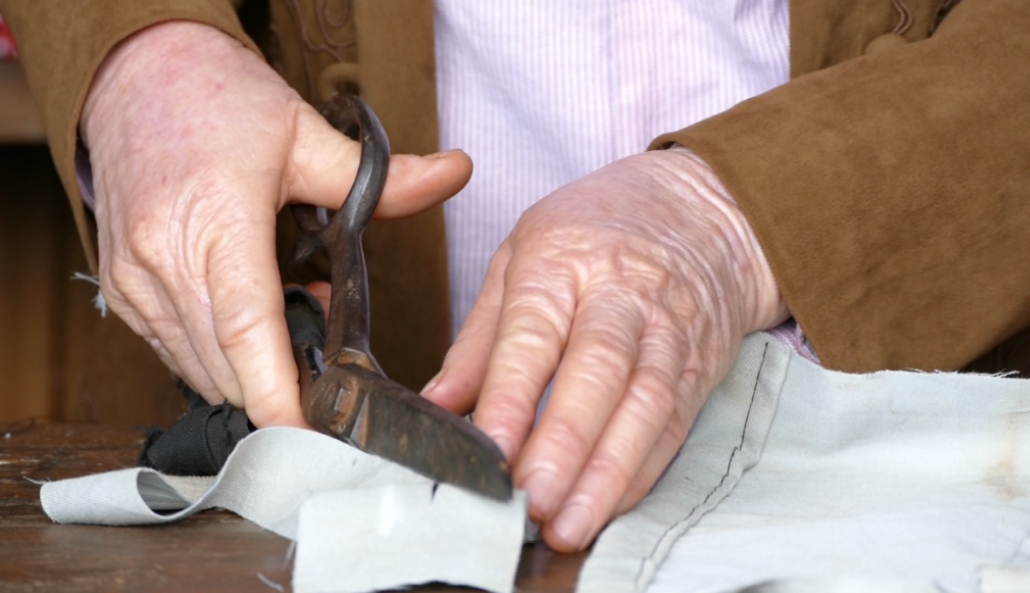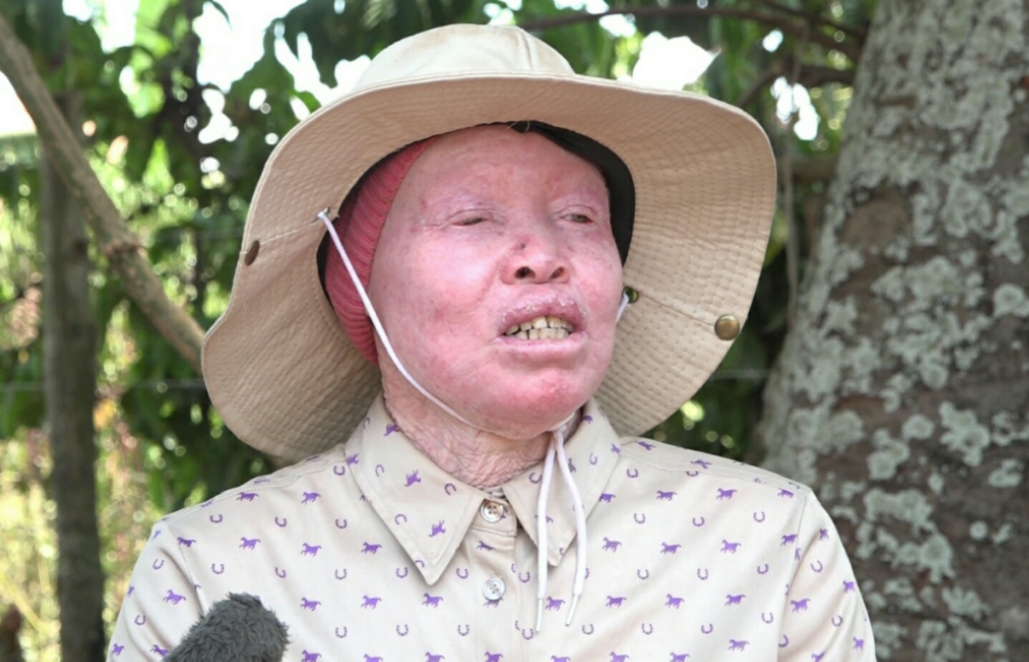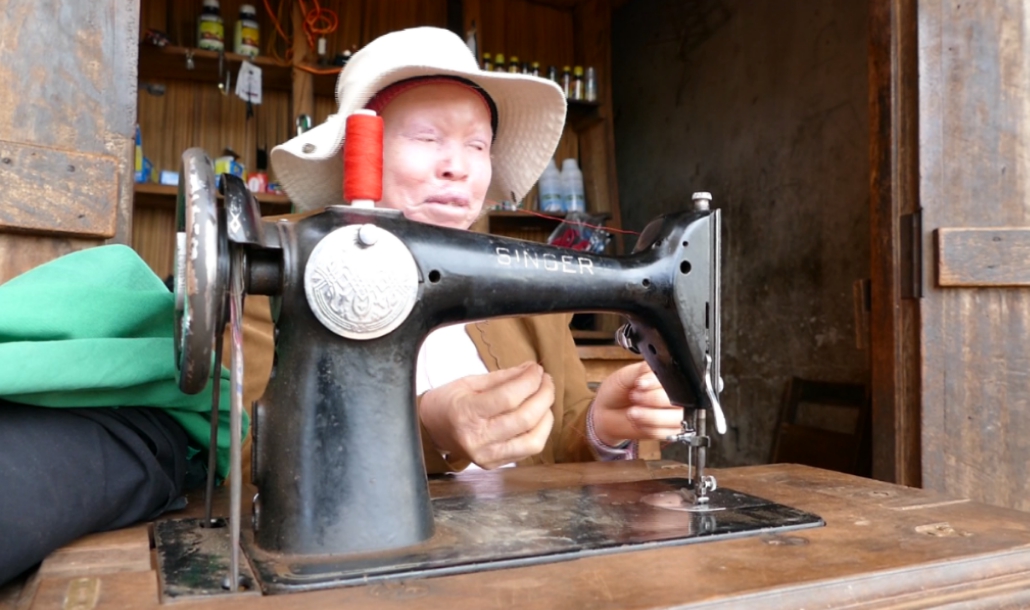In our latest special in the Albinism series, we feature, the life of 39-year-old Hasifah Namulondo who has toiled to fend for her children amid resentment for her skin colour.
Born in Budima in Jinja, presently Kamuli district, in a family of nine with five children (3 girls and 2 boys) living with Albinism, Hasifah shares with us the high and low ends of her life to adulthood.
Unlike her brothers who were able to go through normal school to get a decent future, Hasifah dropped out of school at age 15.
“It was not because my family was too poor but my dad had made up his mind not to pay for us girls at school,” Hasifah said as we started our discussion.
Inquisitive to know why she could not go to school yet she had reached Primary Six, Hasifah revealed that her parents just stopped her from going to school to instead prepare her for marriage.
“I was only 15 years old by then. I had no option and was too young to decide. When he [father] told me the news of getting married, I refused. I stayed home for two good years hoping my dad would change his decision but this was not close to his thoughts”.
With no option and with two wasted years, Hasifah gave in to the father’s demand and walked in to a start a family she was never prepared for.
Asked why she had finally decided to get married, she responded; “I was tired of staying at home more so I was told that even if I was taken to school, the man who had promised to marry me would get me out of school. He had the money, so, he could do anything. My parents listened to him and by then, the elders’ decision was almost final”.
It was then that the life of the 15-year-old girl whose lifelong dream of becoming a doctor was shuttered and came down to becoming a young mother.
Hasifah, a mother of 5 says that when she finally decided to move out of her father’s house to go and start a family, she was shocked to find that she was actually the fourth wife and the youngest of all.
She narrates; “My husband had three other women. I was young and scared of all of them. Life was hard to live in such an environment. Worse still, when I realized I was pregnant with my first born, none of the women ever wanted to see or associate with me given the complexion of my skin and the stigma associated with Albinism”.
But it was too late. It seemed there was little Hasifah could change about her destiny. She has been chained to her marital roles and to give up all her desires to become a mother and wife.
This is when she hatched a plan to undergo a skills training program to help support her livelihood.
Sensing that she was now locked to her family, Hasifah convinced her husband to at least enroll her for a vocational training course so she could get some skills in tailoring.
“He took me to some lady to help me do my training from there. It was not a school but yes, I got the training but even while at the centre, I still had issues with the trainer. She was not confortable with me using her sewing machine,” Hasifah tolds SoftPower News in an interview.
This difficulty prompted Hasifah to request her husband to buy her a sewing machine which she could use while at home. But fulfilling this request seemed to drag on and on.
She says she told her husband about what she was going through at the training center but the husband gave her a deaf ear. This resulted into a family wrangle that forced her to quit her marital home for some time because she thought she was not being taken serious.
“I left my house and went back to my father’s house. My dad convinced me to go back as he promised to buy me a sewing machine,” she says.
The trick had worked. Indeed upon her return to her marital home after two weeks, she had been blessed with a brand new sewing machine. For Hasifah, it was time for her to perfect her skills and make some money.

All she required was a little more training at the centre and in no time, her house had turned into a workshop for mending petty damages and designs for kids in the area.
Family life
Eventually, Hasifah became a mother of two and it was while she was expecting her third born that all hell broke loose.
“I was working at my restaurant in Budima trading centre, when I returned home my neighbors shocked me with the news of my husband’s arrest. I was in panic,” she narrates.
“I opted to go see where he had been taken but I was advised to stay till the next day. The next day at 6am, I boarded the next taxi to go see my husband only to be told he had been murdered”.
When she got to the scene of her husband’s murder, everything there was ugly. Her husband had been killed, packed into a bag and thrown into River Nile. She never got a chance to bury him. This was the beginning of yet another life of struggle for Hasifah and her children.
We sought to understand what could have led to her husband’s brutal death. Hasifah said that her husband who was a renown businessman is likely to have been killed on political grounds since he was an agent of UPC and by then, many of them were being witchhunted by the regime.
Like any other young family, relatives began to scare her away so they could take her late husband’s property. She was intimidated but because she had children, Hasifah stood her ground and stayed. They almost threw her away with the children from a house her husband had built for her.
With a lot of struggles, Hasifah had to draw another line of survival. She continued to juggle between cooking at the restaurant and sewing cloths in Budima village where she still stays. However, when she gave birth to her third born just three months after her husband’s death she had to quit the restaurant business.
She delegated some people to take over with the hope that they would maintain its operations but sooner, the business would collapse as the new workers kept cheating her.
Returning to her parents
“I left and returned to my father’s place to start farming since the restaurant business was not paying at all. After one year in the farm with my children around me, I saw light because I would sell from and yield and part of the money helped me educate my children”.
She hustled on to ensure that life did not break her down. Her new routine alternated between farm work and her tailoring. Business, was on and off, she says.
“I had to hustle to find a way to survive. When one of the businesses is not doing well, you are sure of the other alternative,” Hasifah said.
At some point, even the sewing machine that earned her some money to buy the most basic household items had to be sold off. She sold it to pay for her daughter’s examination fees so she could sit her Uganda Certificate of Examinations (UCE).
With no sewing machine and fear for the sun, Hasifah is worried her skin will be further affected by the scotching sun exposing her to more health risks.
“People with Albinism are not friendly to the sun, so if I can find a sewing machine, I will be very happy because I sometimes have to hire and when I do not have money, I just sit back”.
Fortunately, none of her kids has Albinism.
Afters years of living on her own, Hasifah opted to get married again. He got a man and the two got two children together. But there, she faced a challenge of acceptance.

“The man never appreciated me. He was told never to take a white woman to their home,” Hasifah said.
She noted that the life, family and relation issues of people with albinism is just full of trials and tribulations “because no man is willing to openly come up and tell you his mind; they want to be with us but none of them wants to settle with a person with Albinism”.
But the two later officially wedded.
Hasifah says people should stop discrimination on persons with disability because, it’s wrong and they are human too.








